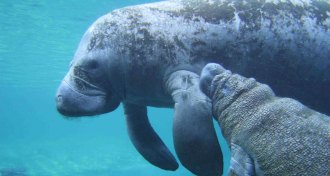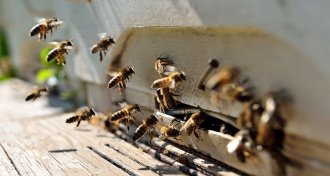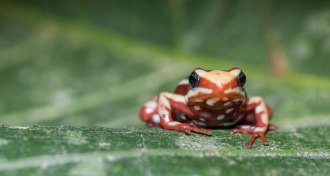Toxicology
-
 Environment
EnvironmentChemicals in biodegradable food containers can leach into compost
PFAS compounds from compostable food containers could end being absorbed by plants and later eaten by people, though the health effects are unclear.
-
 Animals
Animals50 years ago, DDT pushed peregrine falcons to the edge of extinction
In 1969, peregrine falcons were at risk of extinction. But a ban on the pesticide DDT and new captive breeding programs allowed the raptors to recover.
-
 Environment
EnvironmentAn acid found in soil may make a disease killing deer less infectious
An incurable neurodegenerative disease crippling North American deer, elk and moose may be thwarted by an organic soil compound.
-
 Animals
AnimalsA ghost gene leaves ocean mammals vulnerable to some pesticides
Manatees, dolphins and other warm-blooded marine animals can't break down organophosphates due to genetic mutations that occurred long ago.
-
 Health & Medicine
Health & MedicinePediatricians warn against chemical additives in food for kids
Common food additives found in meats, plastic packaging or metal cans may contain chemicals that harm children’s health.
-
 Health & Medicine
Health & Medicine‘The Poisoned City’ chronicles Flint’s water crisis
A new book examines how lead ended up in Flint’s water and resulted in a prolonged public health disaster.
-
 Environment
EnvironmentHow bees defend against some controversial insecticides
Some bees have enzymes that allow them to resist toxic compounds in some neonicotinoid pesticides.
By Dan Garisto -
 Environment
EnvironmentThe way poison frogs keep from poisoning themselves is complicated
Gaining resistance to one of their own toxins forced some poison dart frogs to make other genetic tweaks, too.
-
 Environment
EnvironmentNew material could filter water contaminants that others miss
A new polymer offers a better way to pull fluorine-containing pollutants out of drinking water.
-
 Genetics
GeneticsEpigenetic marks may help assess toxic exposure risk — someday
Exposure to things in the environment may change chemical tags on DNA and proteins, but it’s still unclear how to use that data to assess health risks.
-
 Quantum Physics
Quantum PhysicsFinding wonders in fat
In the latest issue of Science News, Editor in Chief Eva Emerson talks fat cells, thermodynamics, and lead poisoning.
By Eva Emerson -
 Agriculture
AgricultureFDA to test foods for controversial herbicide
Amid controversy and conflicting studies, the FDA will test food for glyphosate, the most widely used herbicide in the world.